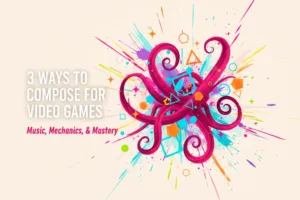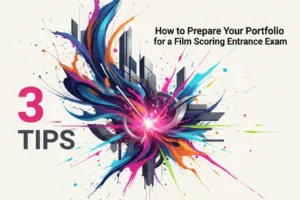
On Working with Directors: Essential Tips for Composers
⏱️ Reading time: 6 minutes
Working with directors is arguably the most critical skill you’ll develop as a film composer: yet it’s rarely taught in traditional music programs. Whether you’re preparing for NFTS entrance exams or RCM entrance exams, understanding director-composer dynamics will set you apart from other candidates and establish the foundation for a successful career in professional film composition.
After years of film composer mentorship and teaching film scoring lessons, I’ve observed that the most successful composers aren’t necessarily the most technically proficient: they’re the ones who can navigate the complex psychology of collaboration. Let’s break down the essential skills you need to master.
Understanding Director Experience Levels
Novice Directors: Reading Between the Lines
Novice directors struggle to explain what they want, and this creates one of the biggest challenges in film scoring. When a first-time director says they want something “epic” or “emotional,” they’re often expressing a gut feeling rather than a clear creative vision. Your job as a composer is to extract the essence of what they mean, rather than take their words at face value.
During 1:1 composition lessons, I teach students to ask probing questions: “When you say epic, are you thinking about the scale of the emotion or the instrumentation?” or “What moment in the film made you feel most connected to the character?” These questions help directors articulate their instincts more clearly.
The key is patience and translation skills. Novice directors may use vague descriptors like “bigger” or “more intense” without understanding the musical implications. Your role becomes part therapist, part translator, helping them discover what they actually need for their story.
The Spotify Playlist Red Flag
Here’s a major warning sign: directors making Spotify playlists as reference material. While temp music can be helpful, Spotify playlists often reflect the director’s personal listening taste, not what the story actually needs.
I’ve seen directors include everything from their morning workout playlist to their late-night study music, thinking it captures the “vibe” of their film. The problem? Personal taste rarely aligns with narrative requirements. A director might love ambient electronic music but be making a period drama that calls for orchestral scoring.
When presented with a playlist, dig deeper:
- “What specifically about this track connects to your story?”
- “Is this the energy level you want, or the instrumentation?”
- “How does this serve the character development?”
Remember, your job isn’t to recreate their personal soundtrack: it’s to serve the story. This distinction becomes crucial when building your portfolio guidance for film schools, as admissions committees can spot composers who merely copy reference tracks versus those who create original solutions.
Experienced Directors: Precise Communication
Experienced directors give precise feedback without micromanaging your creative process. They won’t dictate whether you should use strings or synthesizers, but they’ll clearly explain why something doesn’t work: “The music is fighting the performance here” or “We’re losing the character’s vulnerability in this moment.”
This precision comes from years of understanding how music functions in storytelling. Seasoned directors speak in terms of story beats, character arcs, and emotional trajectory rather than musical terminology. They trust your expertise while providing clear directional guidance.
Working with experienced directors teaches you to:
- Think compositionally about story structure
- Understand subtext and emotional layers
- Develop confidence in your musical choices
- Learn industry-standard communication practices
Developing Compositional Empathy
Composers need empathy: and I’m not talking about feeling sorry for stressed directors. Professional empathy means understanding the director’s creative pressures, budget constraints, and artistic vision well enough to anticipate their needs.
Part of your job is interpreting and bridging the communication gap between musical and cinematic languages. Directors think visually and narratively; composers think harmonically and rhythmically. Your empathy skills help translate between these different creative vocabularies.
Consider this scenario: A director keeps rejecting cues, saying they’re “too much.” An empathetic composer recognises this might mean:
- The music is competing with dialogue
- The emotional tone is ahead of the story
- The instrumentation is distracting from visual elements
- The director feels uncertain and needs reassurance
Developing this interpretive ability comes through experience, but you can accelerate the process through film composer mentorship and practical application.
Communication Strategies That Work
1. Establish a Common Language Early
During your first meeting, identify the director’s communication style. Do they respond better to musical examples, visual metaphors, or emotional descriptions? Some directors connect with “this feels like a warm embrace” while others prefer “we need something that doesn’t compete with the dialogue.”
2. Use Story-Centered Discussions
Always frame musical choices within narrative context. Instead of “I want to use a minor seventh chord here,” try “This harmony supports the character’s uncertainty without overwhelming the moment.” This approach shows you understand their priorities.
3. Prepare Multiple Options
Smart composers present alternatives: “Here’s a version that supports the emotional subtext, and here’s one that stays out of the way of the performance.” This demonstrates flexibility while giving directors agency in the creative process.
Learning Through Experience
The most valuable film scoring lessons happen through real-world application. Even if you’re still preparing your entrance portfolio, seek opportunities to practice these skills:
- Score student films (even unpaid projects build essential experience)
- Attend film screenings and analyze director-composer relationships
- Study behind-the-scenes content that shows collaboration processes
- Practice spotting sessions with any available footage
These experiences teach you what classroom theory cannot: how to read personalities, manage creative conflict, and maintain professional relationships under pressure.
Building Your Professional Foundation
Whether you’re targeting NFTS entrance exams, RCM entrance exams, or building a portfolio independently, demonstrating collaborative skills sets you apart. Admissions committees and potential clients want evidence that you can work effectively with directors, not just compose impressive music.
In your portfolio, include:
- Collaborative process documentation (emails, notes, revision examples)
- Multiple versions of cues showing your adaptability
- Story-focused explanations of your musical choices
- Evidence of effective communication with filmmakers
This approach to portfolio guidance for film schools demonstrates maturity and professional readiness that technical skill alone cannot provide.
The Long Game
Mastering director collaboration isn’t about becoming a people-pleaser or abandoning your artistic voice. It’s about becoming fluent in the language of cinematic storytelling while maintaining your musical integrity. The most successful composers develop reputations as both talented musicians and reliable collaborators.
Remember: directors have final creative authority, but they hired you for your expertise. Your job is finding the sweet spot between serving their vision and contributing your unique perspective. This balance defines professional film composition at its highest level.
Start developing these skills now, regardless of where you are in your career. Every interaction with a filmmaker: from student shorts to major productions: is an opportunity to refine your collaborative abilities. The technical skills will develop with practice, but the interpersonal skills that make you an invaluable creative partner? Those take intentional cultivation and genuine commitment to understanding the director’s craft as deeply as your own.
Your success as a film composer depends as much on your ability to interpret, communicate, and collaborate as it does on your musical talent. Master both, and you’ll find yourself not just getting hired, but getting hired again.
Tag:Film Composition, Industry, Tips



